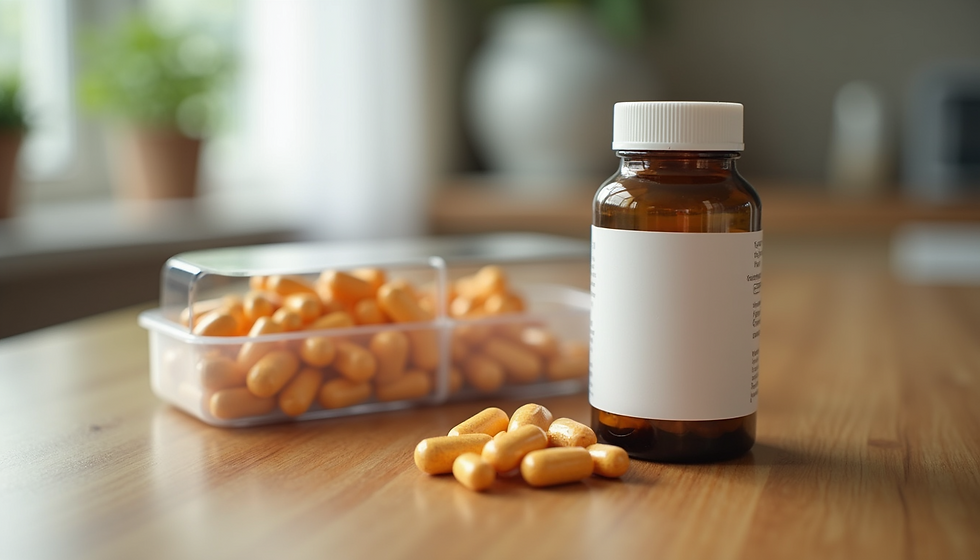PCOD: Symptoms & Treatment
- Anurag

- Jan 12, 2021
- 4 min read
Updated: Oct 19, 2023

Many of us mistakenly believe that polycystic ovarian syndrome (PCOS); a common hormonal imbalance in women only affects her menstrual cycle and fertility. However, PCOS is a complex disorder which can impact many body systems. Symptoms of PCOS are often heartbreaking, both emotionally and physically. It can affect the female reproductive health in a truly devastating manner. Quick and accurate diagnosis followed by proper treatment on priority can help prevent significant long-term health consequences.
Ovaries in girls produce the hormones estrogen, progesterone, and androgen that regulate the menstrual cycle and cause ovulation. While estrogen and progesterone are female sex hormones, androgens are termed as male hormones, and are usually produced only in small amounts in females.
Syndrome complex
Polycystic ovarian syndrome commonly termed as PCOS is a common health problem among teenage girls and young women. It is named such because of the presence of numerous small and painless cysts in the ovaries of women affected. In PCOS, there is an excess production of androgen along with changes in other hormone levels such as luteinizing hormone (LH), estrogen, and progesterone. Higher levels of androgens interfere with the development and release of the egg from the ovary. The eggs do not mature and are not released during normal ovulation in each monthly cycle. Instead, they develop into cysts (little sacs filled with liquid) and get enlarged.
Causes
There is no clear understanding on why or how the changes in the hormone levels occur if you have PCOS. You may suffer from PCOS, if your ovaries produce higher than normal levels of androgens. You are also seen to develop PCOS, if your body produces too much of insulin that in turn signals your ovaries to produce excess amount of male hormones. Another hormone implicated in PCOS is the excessive

production of LH that stimulates the ovaries to produce hormones. Unhealthy Lifestyle is also adds to occurrence of PCOS.
Symptoms
The major symptoms you may experience are changes in your menstrual cycle and development of male sex characteristics. You may either suffer from absent periods for varying durations or irregular menstrual cycles that are more or less frequent, and may range from light to very heavy. You may find difficulty in getting pregnant. You may be overweight, have acne, oily skin, dandruff, patches of skin on the neck, arms, breasts, or thighs that are thick and dark brown. You may also experience pelvic pain, sleep related problems, and episodes of anxiety or depression. You may also show certain male sex characteristics such as decreased breast size, deep voice, enlargement of your clitoris, increased body hair over your chest, abdomen, face and nipples, and thinning of hair on your head causing male pattern baldness.
Diagnosis
There is no single test to determine or diagnose if you have PCOS. Your evaluation at your doctor’s clinic will initially include a detailed medical history about your menstrual cycle, weight changes, and other physical symptoms. Physical examination will include assessment of your body mass index, blood pressure measurement, and inspection for areas of increased hair growth. Your doctor will want to do a pelvic examination to check if your ovaries are enlarged. Blood tests that your doctor would prescribe for you would include measurement of your sex hormone levels, glucose, and insulin levels.
Your doctor will also perform a vaginal sonogram (a test that uses sound waves to take pictures of the pelvic area) to view your ovaries for cysts, and the endometrium/ the lining of your womb to check for hyperplasia/thickening.
Treatment

PCOS is treatable as it is Lifestyle Disorder and can be corrected with few changes in dietary habits and with help of few medications. The main reason why you should take treatment for PCOS is to ameliorate physical changes and prevent long term risks to your health. Your doctor will decide on the treatment options for you based on your symptoms, whether or not you want to get pregnant, and as preventive management to lower your chances of getting heart disease and diabetes in the future.
For the monthly cycle
If you do not want to get pregnant then your doctor may advise you on use of birth control pills to regularize your menstrual cycle and reduce levels of the male sex hormone. However you need to keep in mind that your cycles may get irregular again once you stop the pills and also the pills are not completely free of side effects if taken for a long duration.
For fertility
If you want to conceive, your treatment may include fertility medications, the antidiabetic medication helps by affecting the way insulin controls blood sugar, lowers testosterone production, slows growth of abnormal hair, restores ovulation, decreases body mass, and improves cholesterol levels.
For the excess weight
You may need to implement lifestyle measures such as eating a healthy diet and exercising regularly, online consultation is also available PCOS patients.
Complications
If you have PCOS you are at a greater risk of developing serious health conditions. You are more likely to develop diabetes before the age of 40. The increased likelihood of obesity, high blood pressure, high levels of LDL (bad) cholesterol, low levels of HDL (good) cholesterol increases your risk of getting heart attack by over 4 to 6 times as compared to women of your age.
Sleep apnea (cessation of breathing for short periods of time during sleep), depression, and anxiety are other complications that you may develop.
You are also at an increased risk of developing endometrial cancer (cancer of the lining of the womb) due to the persistent elevated levels of the hormone estrogen and low or almost absent levels of progesterone due to PCOS that causes the lining of the womb to grow too much.





Comments